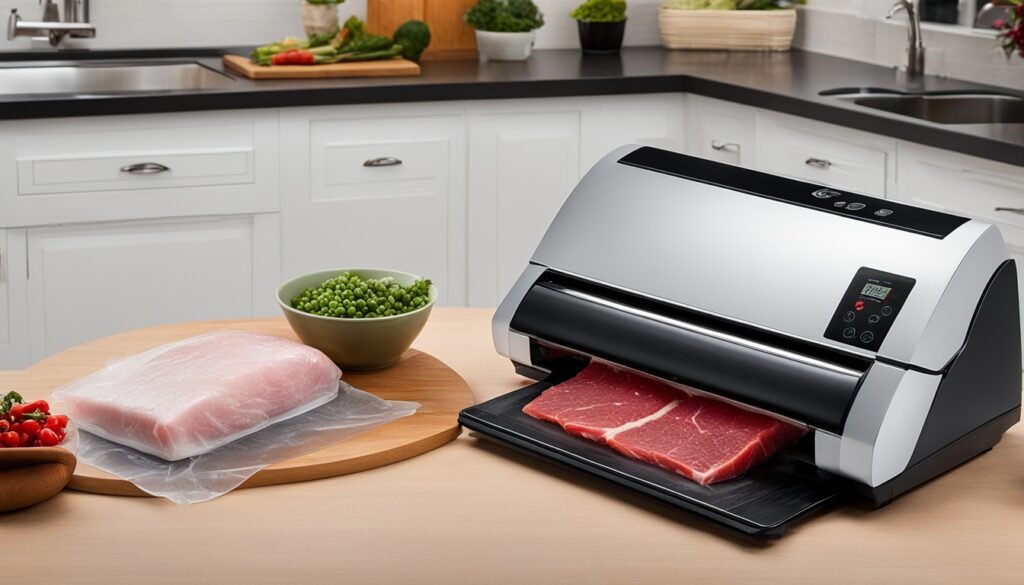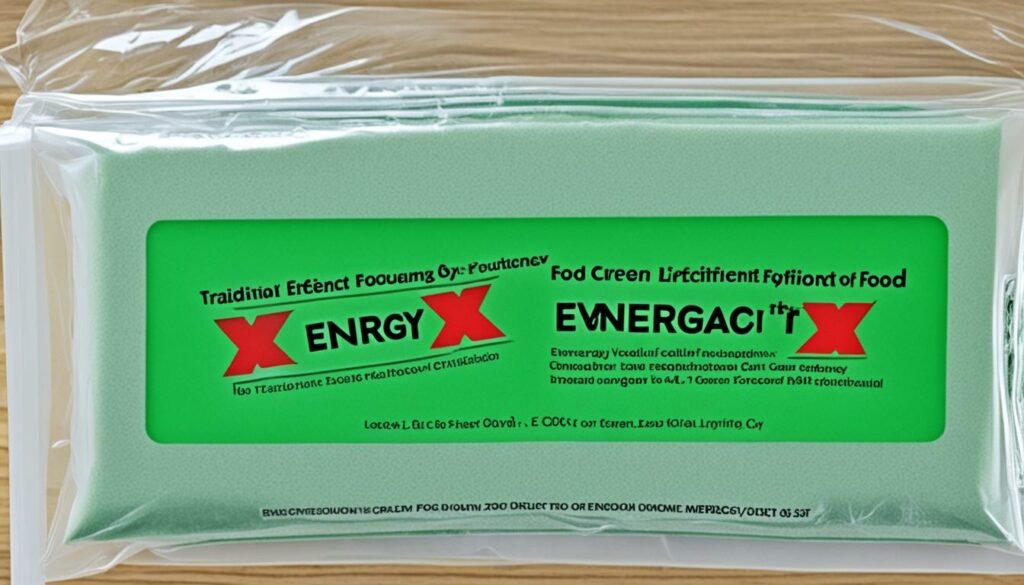Curious about how your vacuum sealer choice affects not just your food but your energy bill too? The debate between energy-efficient and traditional sealers is key in today’s kitchens. It’s a battle worth exploring.
Vacuum sealers are vital for keeping food fresh longer. They work by removing air and sealing food tightly. Let’s look at what makes energy-efficient and traditional models different. While devices like the Nesco VS-12 offer features for various foods, traditional models like the FoodSaver V4840 shine with strong motors and smart bag detection.
Knowing the differences helps us pick the right sealer for our needs. Whether it’s to keep bulk food fresh, marinate meats, or cook with sous vide, there’s a perfect choice. Join us to compare, and see what each sealer has to offer.

Understanding Vacuum Sealer Technology
Almost one-third of all food made globally gets thrown away. That’s why exploring new ways to keep food fresh longer is crucial. Vacuum sealers are a key tool in this effort. They help reduce waste and make food last longer. No matter if it’s a suction or chamber type, these machines are changing how we store our food.
How Vacuum Sealers Work
Vacuum sealer technology takes air out of the packaging to seal it tight. By doing this, it slows down the food’s aging process. This keeps food fresh up to five times longer than usual. Such an approach can significantly lower food waste and support living sustainably.
Suction Vacuum Sealers
Suction vacuum sealers, often found in homes, work by pulling air out. They can seal many different kinds of foods of various sizes. These devices also have a gentle setting, perfect for protecting delicate foods. If you want to learn more about their sustainability benefits, read this guide on vacuum packaging.
Chamber Vacuum Sealers
Chamber vacuum sealers are better when there’s a need for extreme vacuuming. They are great for foods with liquids or batch cooking. For instance, the Avid Armor can do a powerful seal for special cooking methods. It’s excellent for keeping meats, baked goods, and moist foods fresh for longer. These sealers do a great job preserving food texture and flavor and are very efficient. To know more about vacuum sealing’s uses, check this guide on vacuum technology.
Vacuum sealers can be helpful at home or for businesses. They really boost the way we store and move food around. For a deeper understanding of vacuum sealing, you can read more about the science of it here.
Benefits of Energy-Efficient Vacuum Sealers
Energy-efficient vacuum sealers are great for your kitchen and the planet. They improve your kitchen tasks, save money, and help the environment.
Cost Savings and Reduced Electricity Usage
These sealers save you money by using less energy, which means lower electricity bills. Conventional models use more power, costing you more over time. In comparison, energy-saving models do the same work with less energy.
Sustainability and Eco-Friendly Features
These sealers are good for the planet. They create less waste and help food last longer, reducing how much we throw away. Also, they can keep food fresh in the freezer for up to 2-3 years, much longer than usual.
This helps the environment while meeting the demand for greener products.
Practicality in Modern Kitchens
Modern kitchen design loves these sealers because they’re efficient and don’t waste energy. For example, the FoodSaver V4840 2-in-1 is great for sealing and it saves energy.
It also makes your food storage more organized. You can save money and time by buying food in bulk and storing it properly.
| Aspect | Traditional Storage | Vacuum Sealing | Benefits |
|---|---|---|---|
| Freezer Storage Time | 6-12 months | 2-3 years | Extended preservation, reduces food waste |
| Refrigerator Storage Time | 1-3 days | 1-2 weeks | Increases food freshness and safety |
| Cost Savings | Higher electricity usage | Reduced energy consumption | Lowers utility bills |
| Food Preservation | Subject to chemical spoilage | Prevents chemical reactions | Maintains taste and nutritional value |
Choosing an energy-efficient vacuum sealer helps the planet and saves you money. It’s a smart way to improve your kitchen while caring for the environment.
To learn more about vacuum sealing, check outthis guide.
Advantages of Traditional Vacuum Sealers
A traditional vacuum sealer is great for food preservation. It’s known for making strong seals. The Nesco VS-12, for example, keeps food fresh well, even with things like meat and spices.
Despite not being the newest in energy efficiency, they make up for it with good control and plenty of settings. They work well for both dry and moist foods. The vacuum sealer technology in these machines helps them work with different kinds of bags.
Plus, they’re easy to use. They usually have buttons for simple operation and locking that’s straightforward. This means anyone from experts to novices can use them.
Here’s a table comparing a traditional sealer like the Nesco VS-12:
| Feature | Advantages |
|---|---|
| Powerful Motors | Ensures efficient air removal and sealing |
| Durability | Maintains seal integrity for frequently used items |
| Versatile Settings | Suitable for both dry and moist foods |
| User-Friendly Features | One-touch operation and easy locking mechanisms |
| Compatibility | Works with various types of storage bags |
Clearly, a traditional vacuum sealer has key benefits. These include a strong seal and the ability to handle various foods. So, anyone who values durability and convenience in the kitchen will appreciate it.
Comparing Energy-Efficient vs. Traditional Vacuum Sealers
Choosing between energy-efficient and traditional vacuum sealers involves looking at many things. You need to think about performance, costs when you begin and over time, and what foods they work best with.
Performance and Efficiency
Energy-efficient vacuum sealers, like the Bonsenkitchen, stand out for using less power. They take care of the planet and save you money. Meanwhile, traditional models, such as the FoodSaver V4840, are known for their strong sealing power. They are great at sealing many different types of foods.
Initial Investment and Long-Term Costs
It’s vital to think about the cost at the start and over time when comparing sealers. Energy-efficient ones might cost more at first but save you money in the long run. Traditional models could be cheaper to buy, but they might cost more to run. Weighing these points can help you choose what’s best for you.

Suitability for Different Types of Foods
When it comes to preserving food, each sealer type has its own benefits. Energy-efficient sealers work well with dry items and can keep food fresh for a long time. Yet, traditional sealers make a stronger seal, which is better for foods like those with moisture or liquids.
This flexibility in sealing different food types gives traditional sealers an edge. Users who need to seal a wide variety of foods might find traditional sealers more suitable. They deliver without losing in performance or efficiency.
User Experiences and Reviews
Today, real-life user feedback is crucial in choosing a vacuum sealer. Those passionate about cooking look for insights on how these machines work at home.
Testimonials from Home Cooks
Home cooks love sharing their experiences with vacuum sealers. The Nesco VS-12 is a favorite because it seals foods without ruining them.
It offers a range of sealing options for different foods. This keeps food fresh for longer.
The Geryon E2900-MS is also well liked, and it’s affordable. Users often mention its great performance and simplicity.
These reviews show that good vacuum sealers don’t have to be expensive. They can help save money by keeping food fresh.
Expert Opinions on Vacuum Sealer Models
Experts contribute by giving their views on vacuum sealers. They talk about features that make these devices easy to use, such as easy cleaning and accessory ports.
The FoodSaver V4840 stands out as a top recommendation. Its design and functionality earn praise from culinary pros.
With both user and expert reviews available, consumers get a full picture. This helps them pick a model that meets their needs, ensuring value and quality.
Conclusion
This article has shown the benefits of both energy-efficient and traditional vacuum sealers. Energy-efficient models help cut down on power use and bills. They are great for those focusing on green living.
Yet, traditional vacuum sealers are also valuable. They are well-known for their steady work and can be used in many ways. From keeping bulk food fresh to preparing weekly meals, their versatility stands out. Choosing the right one depends on your personal needs and preferences.
The world of vacuum sealers is evolving fast. New technologies are giving us more ways to keep our food fresh. By choosing wisely, we enhance our kitchen while also fighting against food waste and helping the planet. I trust this article helps you make a smart choice for your food preservation journey.
FAQ
What is the primary difference between energy-efficient and traditional vacuum sealers?
Energy-efficient vacuum sealers help save on electricity. This saves money and is good for the planet. Traditional models offer great performance for all kinds of foods.
How do vacuum sealers work?
Vacuum sealers pull air out of a bag, sealing it tight. This keeps food fresh longer by stopping bacteria growth and oxidation.
What are the benefits of suction vacuum sealers?
Suction sealers, like the Geryon E2900-MS, are good for any food shape. They pull air out from the outside and have gentle settings for fragile items.
What makes chamber vacuum sealers unique?
Chamber sealers pull air out in a closed space, locking in moisture. They’re great for liquids and create a very strong seal. This makes them ideal for sous vide cooking.
What are the cost-saving benefits of energy-efficient vacuum sealers?
Energy-efficient sealers cut down on electricity use. Even though they might cost more up front, they save you money in the long run on bills.
In what ways are energy-efficient vacuum sealers eco-friendly?
Since they use less power, they help reduce your carbon footprint. They join other green appliances in making your home more eco-friendly.
How practical are energy-efficient vacuum sealers in modern kitchens?
These sealers are perfect for today’s kitchens. They offer easy ways to seal food and keep it fresh. They also have features for gentle sealing.
What are the advantages of traditional vacuum sealers?
Traditional sealers, like the Nesco VS-12, are powerful and reliable. They handle a lot of foods, both dry and moist, sealing them well.
How do energy-efficient and traditional vacuum sealers compare in terms of performance and efficiency?
Energy-efficient models are designed to save power while sealing effectively. Traditional sealers may use more energy but they offer very strong seals.
Are energy-efficient vacuum sealers worth the initial investment?
Although they cost more at first, they save on bills in the long term and help the environment. This makes them a good investment.
Which vacuum sealers are better for different types of foods?
Energy-efficient sealers work well for dry foods. Traditional models are best for moist foods because they make a very strong seal.
What do user reviews and testimonials say about vacuum sealer models?
Users love the Nesco VS-12 for gentle sealing and the Geryon E2900-MS for its great value. They show how these models work in real life.
What are the expert opinions on popular vacuum sealer models?
Experts prefer models with many sealing options and easy cleaning. They often recommend the Nesco VS-12 and FoodSaver V4840 for their function and power.
